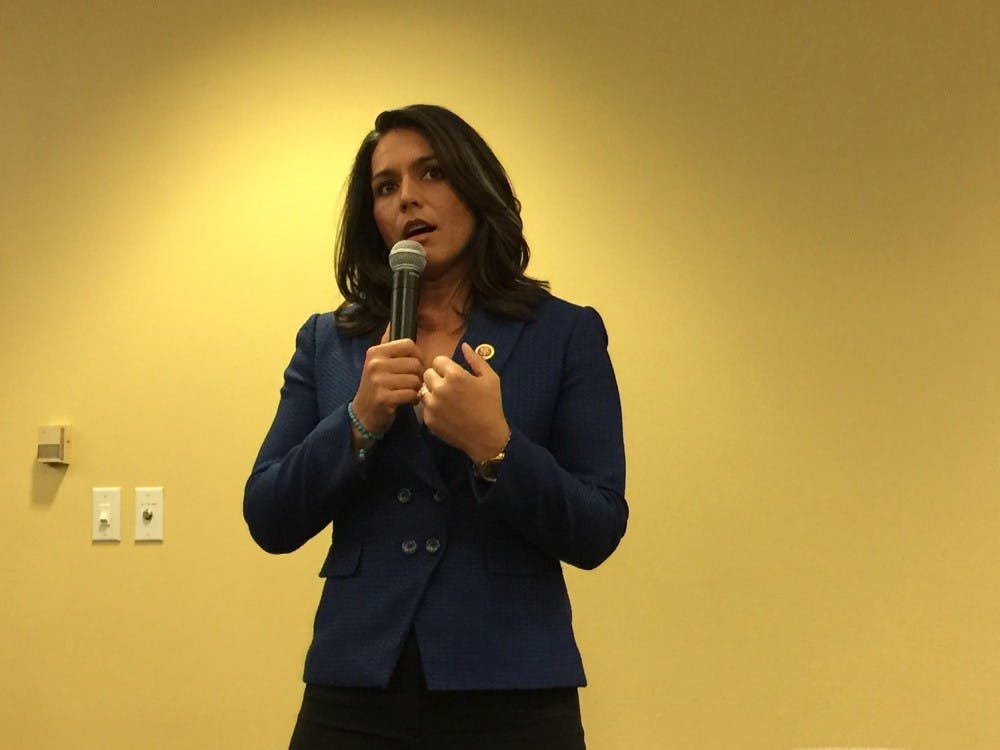Rep. Tulsi Gabbard (D-Hawaii) talked about her time in the military and responded to the recent backlash she experienced from Democrats regarding her views on ISIS at a Kennedy Political Union event held on March 2 in the Mary Graydon Center University Club.
Gabbard is known for being the first American Samoan and the first Hindu member of the United States Congress. She was also one of the first female combat veterans, serving on two combat tours in the Middle East. She now serves in Hawaii's second congressional district and also works on the House committees for Foreign Affairs, Homeland Security and Armed Forces.
“[My parents] taught us that if you see something wrong, if you see a challenge, don’t sit on the sidelines,” Gabbard said. “Ask yourself the question, ‘How can I best be of service, how can I best make a positive impact on those around me?’”
Gabbard aimed to assist the United States’ challenge with the Islamic State of Iraq and Syria during a Fox News interview, where she criticized the Obama administration’s view on ISIS.
While discussing the recent ISIS-led execution in Libya, Gabbard said in the Fox interview that she feels “mind-boggled” and “troubled” by the Obama administration’s failure in pinpointing who she sees as the “enemy.” As a result, Gabbard said, ISIS continues to grow.
“This is where the danger lies — is by not clearly identifying the enemy the ideology, radical Islamism that’s driving,” Gabbard said in the Fox News interview. “We continue to find ourselves waging war against people who are not waging war against the United States.”
To those Democrats that criticize her nonpartisan view, she said at the KPU event that she feels a “deep disservice” when people play politics with the ISIS issue.
“I will continue, whether its a Republican or Democrat in the White House—whatever their position is—I will continue to do my best to speak the truth and identify the issues and challenge where I see them and offer up solutions on what I believe is the best course of action moving forward for our country,” Gabbard said.
Echoing her ambitious nature, she urged students to ask themselves a few questions when deciding their futures.
“Whatever path you choose in your life, ask yourself the question, ‘How can I best be of service and how can I best make a positive impact around those around me?’” Gabbard said.
Before winning a seat in Congress, Gabbard’s constituents doubted her ability to serve as a legislature, she said. They used her age and unseasoned politics in their first judgement, recommending that she run later in her life.
“But I didn’t listen to what people said,” Gabbard said. “They said, ‘You’re too young, you’re too inexperienced, you just sit back and wait 20 years and then come back.’”
She said after hearing negative responses to her running, she took to the streets to garner votes.
“I went to exactly where the power lies in this beautiful thing we call democracy,” Gabbard said. “I started going and making phone calls to people, talking to large groups and small groups, and basically asking them if they would hire me.”
Her grassroots campaign style ultimately led her to beat the previous chair by 20 percentage points.
“[My victory] was only made possible because the election wasn’t about a personality,” Gabbard said. “It wasn’t about one person being uplifted. It was about an entire community of people on all of these different islands saying, ‘We’re going to stand up and own our future.’”
Gabbard has been driven by her victory, which has allowed her to see policies in D.C. from a different perspective, she said.
“[My seat] remains an inspiration for me,” Gabbard said. “Everytime I get to go home and see my people, who stood up, grabbing a sign and saying, ‘Aloha! Vote for Tulsi’— that puts everything for me here in Washington in perspective.”
This perspective is one that incorporates the proactiveness she urged students to undertake at the event.
“Don’t sit there and point at both directions saying, ‘Why isn’t someone else doing something about this?’” Gabbard said. “Look in the mirror and ask yourself, ‘How can I be a part of the solution.’”





